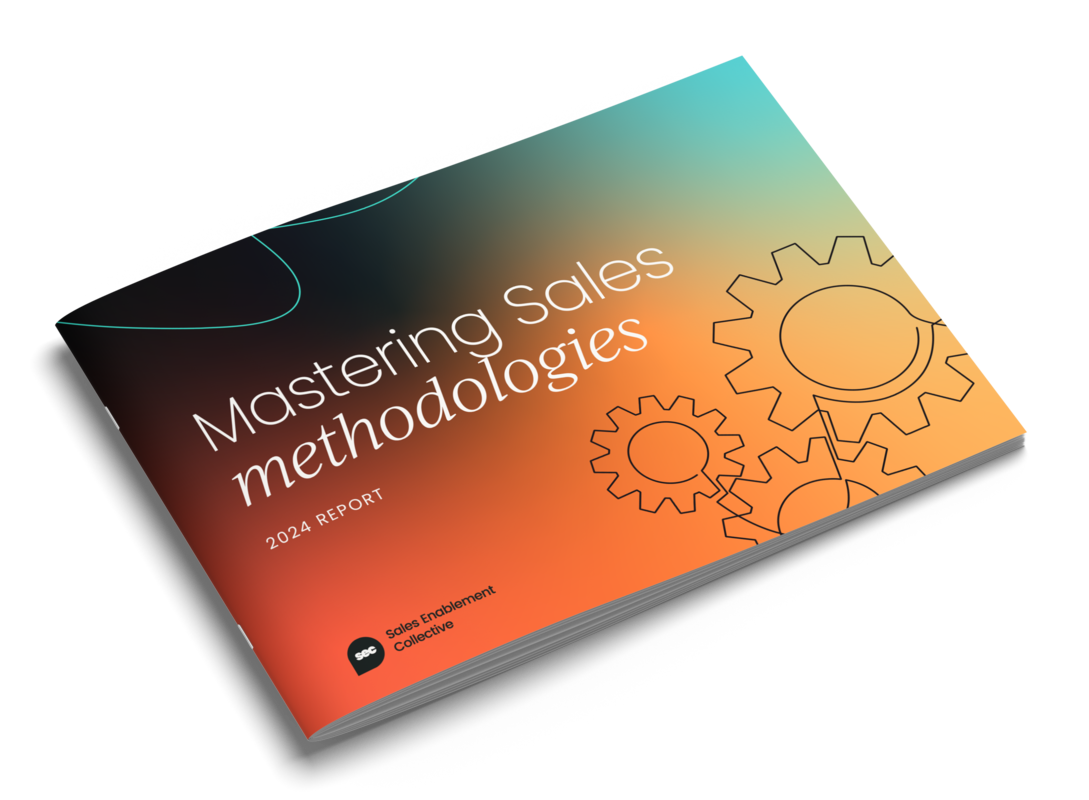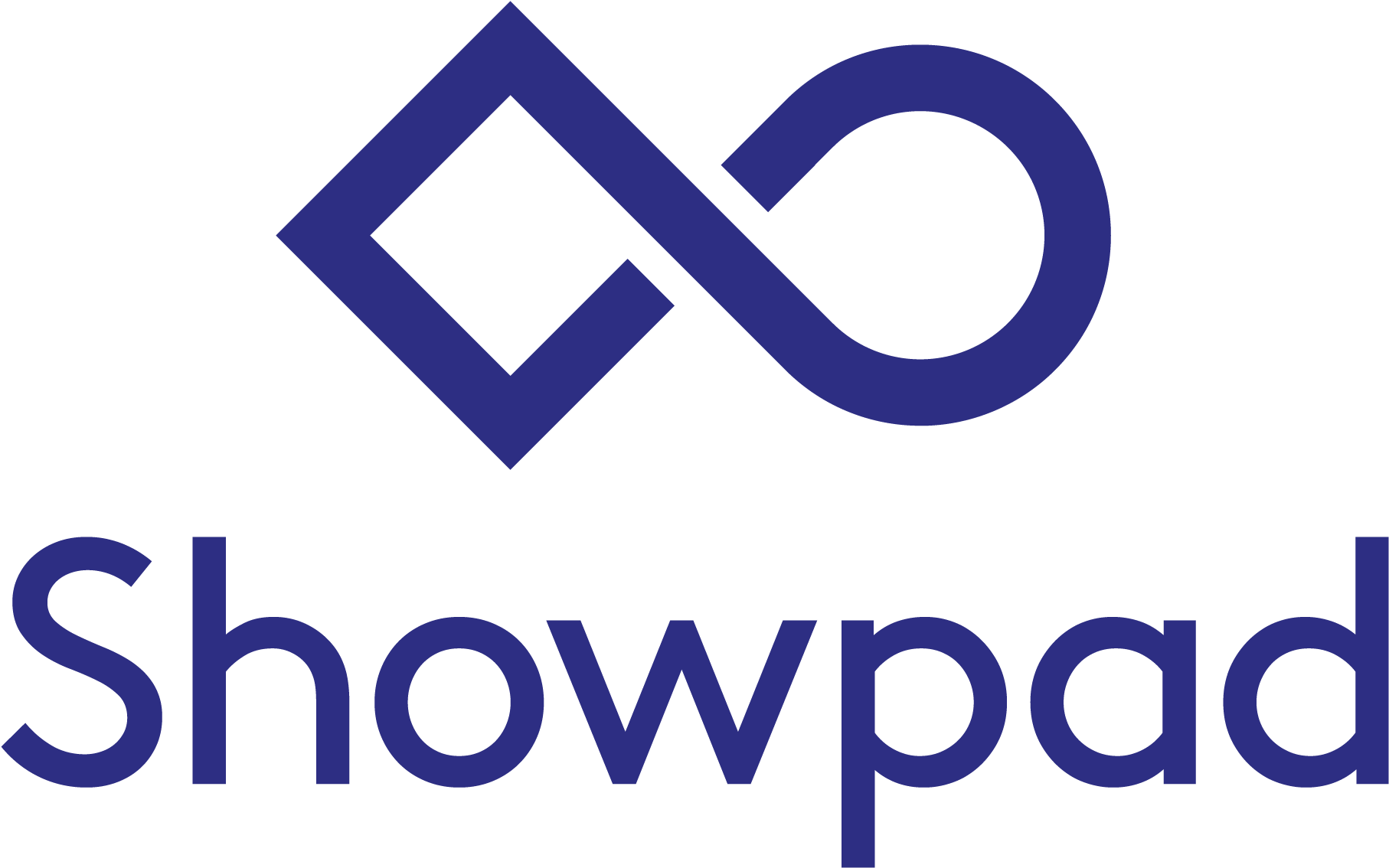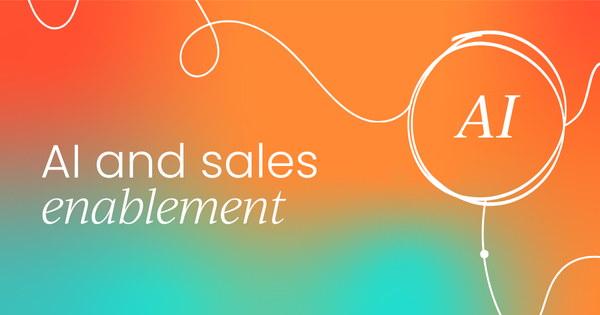At its core, sales enablement is about getting the best out of your sales reps.
It’s about continuously supporting teams of reps in their revenue-generating tasks. There’s no real “end” point. Once a rep’s onboarded? Say hello to coaching and training.
There are always new sales methodologies, techniques, and processes to pass onto your sales teams.
It’s a tough task. We all know it.
Many organizations have small teams with big goals, so sales enablement teams deserve all the help they can get.
Enter artificial intelligence (AI).

Sales enablement and AI
“You hear from enablement all the time that they don’t have the data. AI gives you the data to make good decisions.” – Jonathan Kvarfordt, Founder & Chief AI Officer, GTM AI Academy
AI sales enablement combines artificial intelligence technology with traditional enablement practices to help sales teams work smarter, not harder. It's the strategic use of machine learning, natural language processing, and predictive analytics to automate repetitive tasks, surface insights, and deliver personalized support to sellers.
Think of it as having a brilliant assistant who never sleeps—one that analyzes your sales conversations, predicts which deals need attention, and serves up the perfect content right when your reps need it.
The technology includes several key components:
- Machine learning algorithms that identify patterns in successful sales interactions.
- Natural language processing that understands context in emails and calls.
- Predictive analytics that forecast deal outcomes and suggest next best actions.
- Generative AI that creates personalized content and coaching materials.
AI has incredible potential when used in a sales environment. And best of all? It’s not limited to one area. There are many ways you can use AI to help you achieve your enablement goals.
In this article, we’ll talk about:
- 7 proven ways enablers can use AI to save time
- 5 pain points sellers and enablers hate (and how AI solves them)
There's even more to AI in sales enablement that than, but for the time being we'll cover these three key areas.

7+ ways enablers can use AI to save time
AI isn't just shiny tech, it buys you back real hours. Teams that use AI-powered knowledge management reclaim an average of 4.8 hours every week. Below, you’ll see seven battle-tested ways to snag back those hours for yourself.
Here are seven concrete ways you can use today’s AI tools to save you time as an enabler:
- Automated content creation
- Content recommendations
- AI-guided selling
- Lead tracking, scoring, and prioritization
- Lead gathering and segmentation
- More personalized onboarding
- Personalized sales training and coaching
- AI sales enablement platforms and tools
1) Automated content creation
This is a use case you’re probably familiar with.
You can use Generative AI tools like ChatGPT to create text content for reps.
You feed it the information, and it spits out rep-ready content.
Sure, you might have to tweak it here and there, but this is usually a lot faster than typing out and formatting a first draft yourself.
But now, things are even better.
The surge of new, dedicated AI-powered tools makes things even easier. It’s easier and easier to automate the entire content creation process end-to-end. AI sales tools automatically gather competitive intelligence and format that intel into competitive battle cards and cheat sheets for reps.
2) Content recommendations
“Most people need help at the moment they need it, which means “Just in time” enablement. And AI is perfect for that.” – Jonathan Kvarfordt, Founder & Chief AI Officer, GTM AI Academy
We’ve all struggled with it.
A low content adoption rate is one of the most frustrating things you’ll see as an enabler.
You’ve gone to the hard work of:
- Surveying and speaking with reps to understand their needs.
- Producing content tailored to those needs.
- Organizing that content to make it easily available.
But they’re still not using it.
But your best sales enablement content can change the course of a sales conversation. It can have an impact at the most critical moments in the revenue cycle.
Unfortunately, if reps have to scramble around, manually searching when the stakes are high, their performance won’t peak — it’ll drop.
AI tools can analyze conversations and make smart, on-the-fly content recommendations. Reps don’t have to search at all. AI understands the content, understands the conversation, and acts like a copilot, serving your reps just what they need, right when they need it.
3) AI-guided selling
AI-guided selling is, quite simply, selling guided by artificial intelligence. AI solutions extract sales-related information and use it to provide focused advice to sellers as they sell.
As we’ve discussed, this can take the form of content suggestions, informed by the prospect mentioning a particular competitor, for example.
Back in 2022, our Sales Enablement Forecast 2022 report found that 10.7% of respondents believed that AI-guided selling would be a trend in coming years, with many stating that AI will be “huge” in 2024 and beyond.
They weren’t wrong.
Last year, our 2024 Sales Enablement Landscape Report found that 81% of respondents’ enablement or sales teams use AI as a part of their day-to-day roles at least occasionally. A solid quarter of respondents (25%) use AI tools regularly in their day-to-day roles.
As the AI-driven sales approach becomes more popular, sellers will find key pieces of information landing in their laps, rather than having to spend time searching for them themselves. This means sellers get more value from content, and so can spend more time selling, and ultimately close more deals.
From a sales enablement perspective, this saves you time because the AI takes care of the content-delivery for you. It also makes intelligent decisions about what content to supply, meaning you don’t have to.
Our friends at Seismic go into more detail on AI-guided selling, and why it’ll transform sales, in this whitepaper:

4) Lead tracking, scoring, and prioritization
Nothing wastes time like going after the wrong leads.
A poorly prioritized lead set forces sellers to pursue low-probability opportunities. These poorly qualified leads are unlikely to buy, and might not even be ready for a call.
At best? Reps waste time. At worst? They come across as pushy and put off buyers who, if better qualified, would be more than ready to talk.
AI can track leads as they enter, and move along, your sales funnel. It can track, pull together, and analyze all the data related to each lead very quickly.
It’ll use things like:
- Conversation sentiment analysis,
- Number of touchpoints,
- What content they’ve consumed...
It can even draw on past data from other leads to more accurately predict conversions over time.
Better, more qualified leads, and more data on those leads, gives reps the best chance possible to win those deals.
5) Lead gathering and segmentation
AI can help you capture more and better leads, too.
Scaling sustainably is hard. And in a world where optimizing customer interactions for the best possible experience at every touchpoint is the only way to ensure you’re capitalizing on your opportunities, putting your best foot forward from the first interaction is a must.
Chatbots aren’t exactly new. But smart chatbots that don’t frustrate your prospects? They’re a game changer.
Even once you’ve collected your new leads and made a good first impression, there’s more work to do. An AI can collect data from a chatbot conversation, and categorize the new lead based on past segmentation data.
All of this makes it easier and faster for reps across your revenue teams to identify the hottest leads.
6) More personalized onboarding
If you’re stretched thin, it’s rare you’ll have time to repeatedly audit your programs.
Even so, audits are necessary. Especially for your onboarding program.
Time to first sale (TTFS) is a metric your bosses will have their eye on. And for good reason. Until your reps start making your org money, they’re costing it money. As an enabler, it’s your job to keep TTFS as low as possible. You do this, in part, by making your onboarding program the best it can be.
AI can help.
It can analyze existing onboarding practices and tie them to success metrics. It’ll suggest ways you can make the program better in the short term. More sophisticated tools can actually edit and improve the program itself, tailoring upcoming sessions to each new rep’s needs based on their developing performance data.
7) Personalized sales training and coaching
“As an enabler, I don’t have the bandwidth to go to every sales rep, have them practice with me, give them feedback, then go and review their calls, then go back to them again… Even with a small team of 10, I don’t have time for that. You don’t have time for that.” – Jonathan Kvarfordt, Founder & Chief AI Officer, GTM AI Academy
Collecting data manually is time-consuming. Incredibly so.
Imagine grading every rep’s performance manually according to best practice. An AI role-playing tool can track all of this automatically.
Today, sales enablement departments use virtual AI sales coaches. They allow reps to role-play sales scenarios in a safe environment, as many times as they like. So reps can get comfortable with their pitch and delivery, and move on to a human coach for feedback and final sign-off when they feel ready.
Remember: you’re human and biased. A machine is not. Results, therefore, are more objective with the AI.
An AI can also grade reps quickly across multiple metrics. It can use predictive analytics to figure out where reps are likely to bomb, and tailor a coaching and training program to each rep to bring up the areas where they’re most likely to lose opportunities.
Trying to do this yourself? You’d never finish. You lack the time and the bandwidth. Especially if you’re part of a small revenue enablement team trying to help CS, sales, and other teams.
But AI’s applications in sales go beyond just coaching. There’s a wealth of opportunities for reps to incorporate AI into their day-to-day selling, all of which increase the effectiveness of their sales methods.
8) AI sales enablement platforms and tools
Choosing the right AI sales enablement platform can feel overwhelming. The market's flooded with options, each promising to transform your sales process.
Leading AI sales enablement platforms like Mindtickle, Highspot, and Seismic offer comprehensive features that go beyond basic automation.
Mindtickle's Copilot analyzes role-play sessions and provides instant feedback. Highspot's unified AI creates atomic insights from your entire content library. Seismic uses AI to track content performance and tie it directly to revenue impact.
When evaluating AI sales enablement tools, consider these factors:
- Integration capabilities: Does it work with your existing CRM and sales tools?
- AI sophistication: Look for platforms using advanced NLP and machine learning, not just basic automation.
- Scalability: Can it grow with your team and handle increasing data volumes?
- User adoption: Choose intuitive interfaces that reps will actually use.
Newer players like Spekit take a different approach. They embed AI assistance directly into your existing tools, eliminating the need for reps to switch contexts. This "in-the-flow" enablement often sees higher adoption rates.
Don't forget to pilot before you commit. Most vendors offer trials or proof-of-concept periods. Use this time to measure actual time savings and rep feedback, not just feature lists.
The right sales enablement software should feel like an extension of your team's workflow, not another system to manage.

Getting started with AI sales enablement
Ready to implement AI in your sales enablement strategy? Here's your roadmap to success.
Start small. Pick one high-impact use case. Maybe it's automating follow-up emails or providing real-time coaching feedback. Pilot with a small group of tech-savvy reps who can provide honest feedback.
Your implementation timeline might look like this:
- Weeks 1-2: Audit current processes and identify automation opportunities.
- Weeks 3-4: Select and configure your AI platform.
- Weeks 5-8: Run pilot program with five to 10 reps.
- Weeks 9-12: Refine based on feedback and roll out to full team.
Change management is crucial. Your reps might worry AI will replace them or add complexity to their workflow. Address these concerns head-on. Show them how AI handles the boring stuff so they can focus on building relationships.
Track these metrics to prove ROI:
- Time saved per rep per day
- Content adoption rates
- Average deal cycle reduction
- Increase in qualified opportunities
- Rep satisfaction scores
Common pitfalls to avoid? Don't try to automate everything at once. And don't skimp on training. Even the best AI tool fails if your team doesn't know how to use it effectively.
5 pain points sellers and enablers hate (and how AI solves them)
- Enablement teams are small
- Not enough time spent selling
- Low confidence in decision-making
- Low sales effectiveness
- Missed leads and forgotten follow-ups
1) Enablement teams are small
Enablement teams are small. Even organizations with the best enablement teams leave sellers frustrated, since there’s always more useful material they could have, and more impactful tranings they could run through, that could make their lives easier.
Solo enablers are the norm in a lot of organizations, and the growing trend towards revenue enablement means the function is shifting. More and more, leaders expect their enablers to support multiple teams and business functions...
...Without any more resource to support.
AI tools are cost-effective. And they help you scale. So, with AI on their side, even a small enablement team can have a big impact across teams, making sure sellers have the materials they need to succeed.
2) Not enough time spent selling
Great enablement work gives reps the resources they need to spend more of their time on sales calls. Which means even small improvements in productivity can translate into a bigger bottom line for the business.
Think of AI as the enabler’s enabler. Not only can you delegate high-effort, low-impact work to an AI, freeing up time for you to really move the needle for your sales organization, your reps can do the same thing.
AI tools can do much of the low impact-admin that your reps would otherwise have to do themselves. Logging call details and results in a CRM, or searching for enablement materials, for example.
The net result?
Your reps spend more time selling, more time making the business money, and find it that much easier to hit their targets.
3) Low confidence in decision-making
When it comes to making lasting change, strategy matters. And it’s difficult to create a long-term revenue enablement strategy that works without data to back up your decisions.
AI can give you that data. Data that would be impossibly time-consuming to collect manually.
Not only does having that data make you more confident in your approach, it also:
- Makes you more persuasive when it comes to getting buy-in from other stakeholders.
- Allows you to pivot more quickly when things aren’t working.
AI, therefore, not only helps you get more done. It helps you get more of the right things done to make the biggest impact possible, all with the support of others in the business.
4) Low sales effectiveness
There’s nothing more demoralizing than feeling like your efforts aren’t paying off.
To show up, day after day, and feel like you’re just not moving the needle. A scenario like this has only one end destination (and it’s a productivity killer.) The question: “What’s the point?”
If your reps are asking this question, you have a massive problem. One that’s deep-rooted, and can take a monumental effort to fix.
AI-powered sales enablement improves your productivity, can take care of repetitive tasks for you, and allows you to make better decisions.
When you pair knowledge-sharing with targeted coaching, performance skyrockets. According to our research into our latest Sales Enablement Landscape Report, teams that routinely share best practices hit 82% of quota, compared with just 32% for those who don’t. That kind of lift turns ‘meh’ pipelines into revenue machines.
5) Missed leads and forgotten follow-ups
Following up with relatively unqualified leads can feel like a lot of work. Especially when those leads are picked up too early in the funnel to be high-probability prospects.
But ignoring them isn’t an option. You need to nurture your leads. And that takes work.
Work that, fortunately, an AI tool can do for you.
Everyone knows it’s best practice to follow up with an unresponsive prospect at least a few times before giving up on them. But the more unresponsive they are, the lower the probability they’ll convert when they do come back to you.
To be smart, you want to make sure your reps are putting the highest probability leads first.
AI sales tools can send personalized, automated follow-ups to prospects, enriching their messaging with information about the prospect’s journey so far, the things they’ve said and tried already, and what has worked and what hasn’t.
Traditionally, this would take a lot of time and attention to detail. Now, you can do it automatically. And reps only have to step in to add real value when a prospect is truly qualified.
This ensures reps are maximizing the ROI on their time, converting as many leads as possible, and driving revenue for the organization.
The future of AI in sales enablement
AI in sales enablement isn't slowing down. If anything, it's accelerating.
Generative AI is evolving from simple content creation to complex scenario planning. Imagine AI that doesn't just write follow-up emails—it predicts deal outcomes based on thousands of similar scenarios and suggests entire engagement strategies.
Here's what's coming next:
- Hyper-personalized coaching: AI avatars that roleplay as specific buyer personas, complete with industry knowledge and personality quirks.
- Predictive enablement: AI that knows what content and training reps need before they do.
- Cross-functional intelligence: AI that connects sales, marketing, and customer success data for complete revenue intelligence.
The integration possibilities are expanding too. AI-driven sales enablement platforms are beginning to connect with:
- Virtual reality for immersive training.
- Augmented reality for real-time meeting assistance.
- IoT devices for gathering customer usage data.
Early adopters already see the upside. In our 2024 Landscape survey, 85% of enablement pros said they’re optimistic about AI’s impact—up seven points year over year. Invest now, and you’ll be riding that momentum, not chasing it, by 2026.
But here's the key: success won't come from having the most advanced AI. It'll come from using AI to enhance human capabilities, not replace them. The winners will be teams that combine AI efficiency with human creativity and relationship-building.
Ready to get ahead of the curve? Start small, measure everything, and remember—the future of AI sales enablement is a journey, not a destination.
Ready to put AI to work in your enablement strategy?
You've seen how AI can transform your sales enablement efforts—from automating content creation to delivering personalized coaching at scale. But knowing what's possible is just the first step.
The real challenge? Actually implementing these AI strategies in your organization.
That's where Sales Enablement Collective's Pro+ membership comes in. Get instant access to:
- Live AI workshops where experts walk you through hands-on implementation
- 60+ battle-tested templates including AI readiness assessments and rollout plans
- Real case studies from enablement leaders who've successfully deployed AI at companies like Google, Oracle, and LinkedIn
- Expert-led certifications to build your AI enablement expertise
- A global community of 30,000+ enablement pros sharing what's working (and what's not) with AI tools
Stop reading about AI's potential. Start realizing it.
Become a Pro+ member and join enablement leaders who are already using AI to 10x their impact. 🚀
Sponsored by:



Sales enablement insider
Thank you for subscribing
Level up your sales enablement career & network with sales enablement experts
An email has been successfully sent to confirm your subscription.
 Follow us on LinkedIn
Follow us on LinkedIn







.svg)